Students living at Ravel fight to keep their homes
‘It's a bummer to have to make way for new tenants’
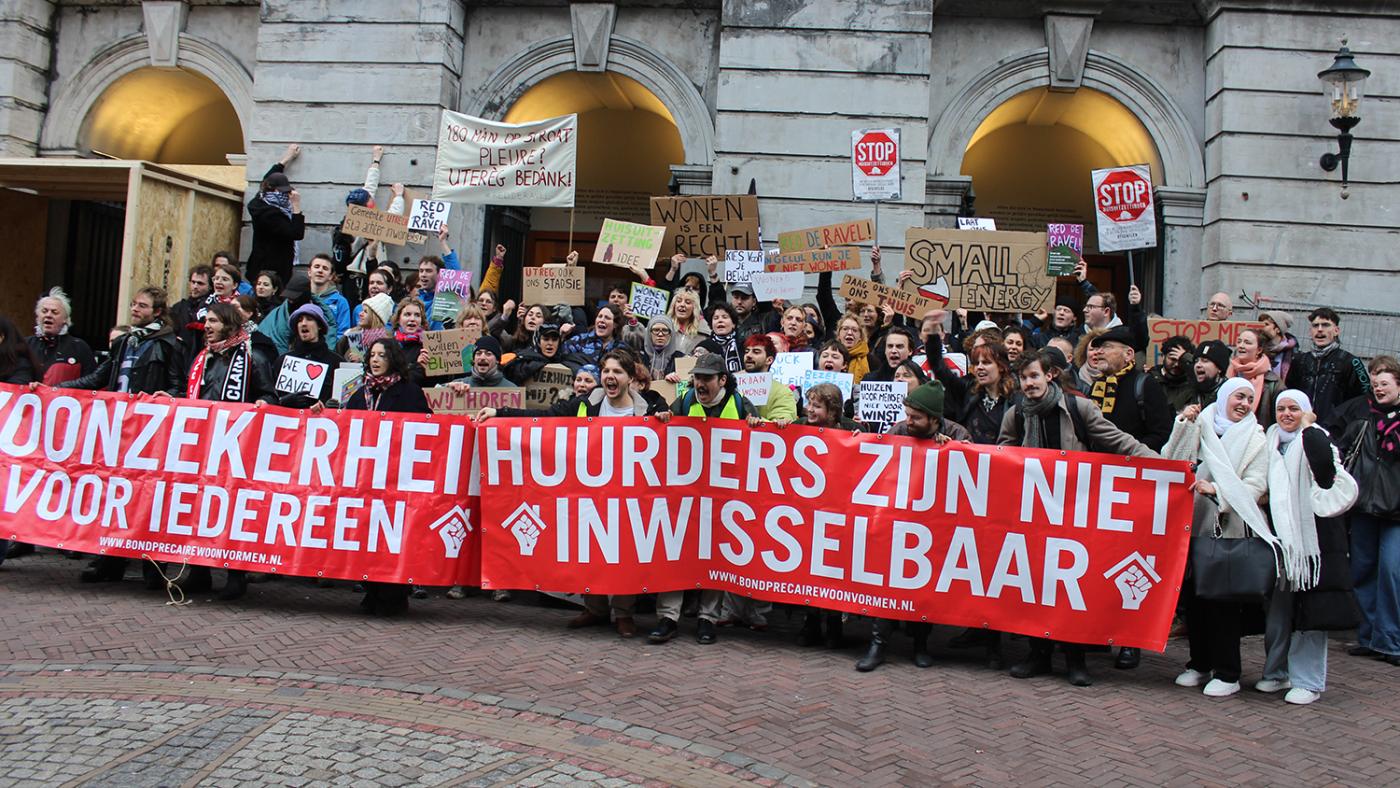
Finding the entrance to the student complex at Ravellaan 96 isn't evident. You must first go down a slope to something resembling a vendor entrance. That's because the building was built in 1970 as an office space for the municipality of Utrecht. The municipality's workers moved to a new office near Utrecht Central Station in 2014, so the nine-storey building was rented out to young people the following year. The students nicknamed it Ravel.
The front door appears to be shut, but a little push is all it takes to get inside. The dimly lit, poster-papered lobby features a rickety lift. Ilse (20) and Sam (22) live on the ninth floor. Ilse is in the second year of a Bachelor's in Interdisciplinary Social Sciences while Sam just finished her thesis for a Bachelor's in Media & Culture studies. But there aren't just students living at Ravel.
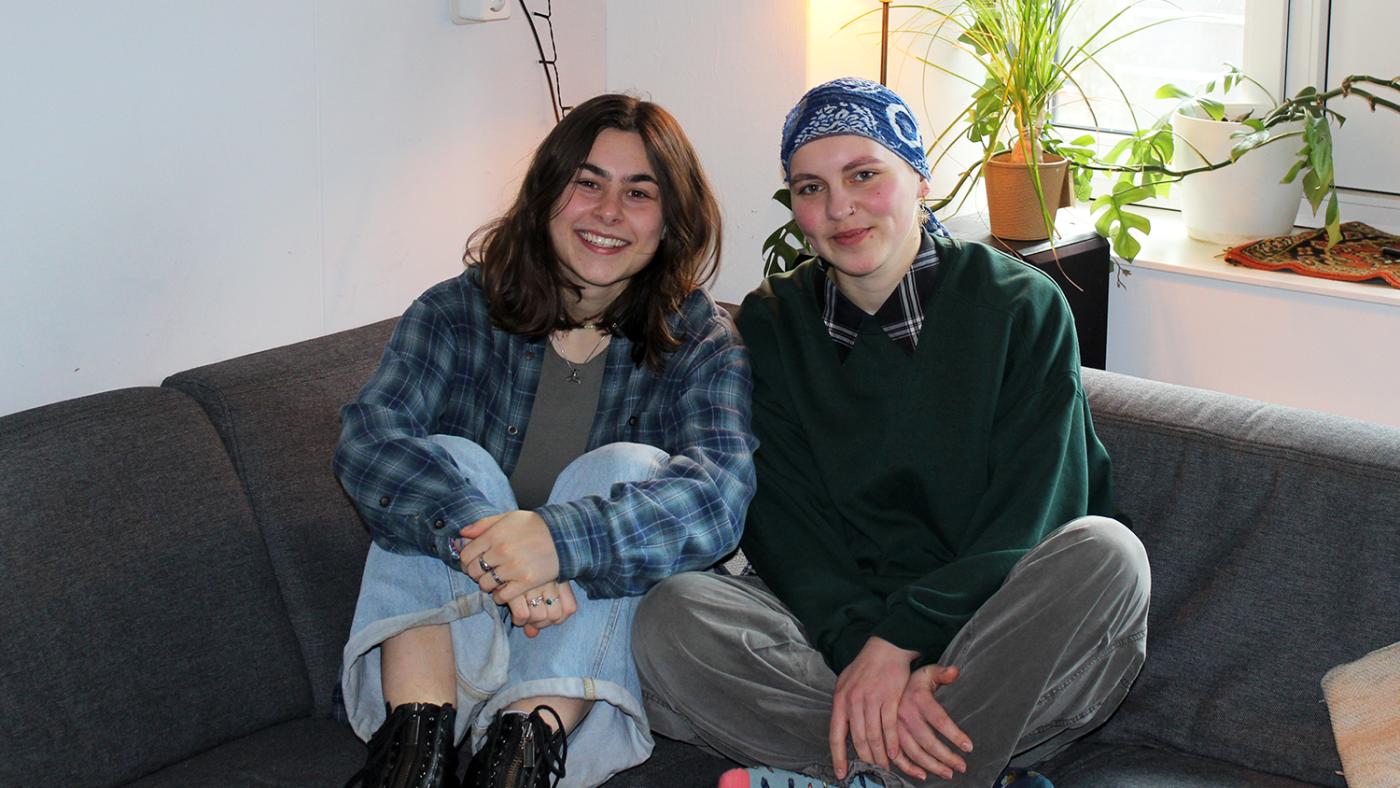
Sam and Ilse. Photo: Koen van den Helder
The house looks like your average IBB home. Twenty people live here, sharing a big, bright living room, a kitchen and sanitary facilities. Everyone has a spacious room that costs between 530 and 650 euros a month, depending on the square footage.
Sam and Ilse are unhappy about having to leave the building, as the people living there have grown close to each other. Sam mentions an example: when the deadline for her thesis was approaching, everyone sympathised with her. "They even baked cake twice. I had cake for lunch and after submitting it. Our roommates were all here when I sent in my thesis." Ilse adds: "If you don't have time to cook, you know someone else will do it. You can always knock on your neighbour's door if you need a hug."
They knew they would have to leave the building at some point. After all, it is stated in their contract. "Still, it is a bummer to be forced to leave only to be replaced by other tenants," Ilse says. The two students feel that alternatives should be sought, such as "extending the current situation, offering us permanent contracts –– which would also give us more housing security –– or renting it out to us as a means to prevent squatting."
'We have no choice'
According to a spokesperson for the municipality, replacing the current tenants with new ones is "the only solution, no matter how regrettable we find it." Ten years ago, the municipality decided to rent out the building due to pending redevelopment plans for the surrounding area. "It would have been a waste to leave the building empty unnecessarily."
The letting was arranged with a 10-year vacancy permit, which allowed Socius to give tenants a temporary contract with which no housing rights could be built up. However, the redevelopment works are taking longer, so the municipality wants to let the property again. But it can't do it with the same tenants because they would be entitled to rent protection, which protects tenants from unilateral termination of rental agreements.
"This is something good, but it stands in the way of the area redevelopment. If the tenants had rent protection, the municipality would have to accommodate them and compensate them for moving expenses at some point. Besides, if we do that for Ravel, we'll have to do the same for all properties we are renting under the vacancy law. At the end of the day, this would mean we'd no longer be able to rent out empty properties temporarily, which is a shame considering the housing shortage."
The spokesperson understands that the situation may seem unfair to current tenants. "This is really unpleasant for them, especially considering how hard it is to find a place in Utrecht these days, but the municipality must also take the city's general interests into account. The area redevelopment is a wish from the municipal council, so this is the collective interest of the council versus the individual interest of the tenant."
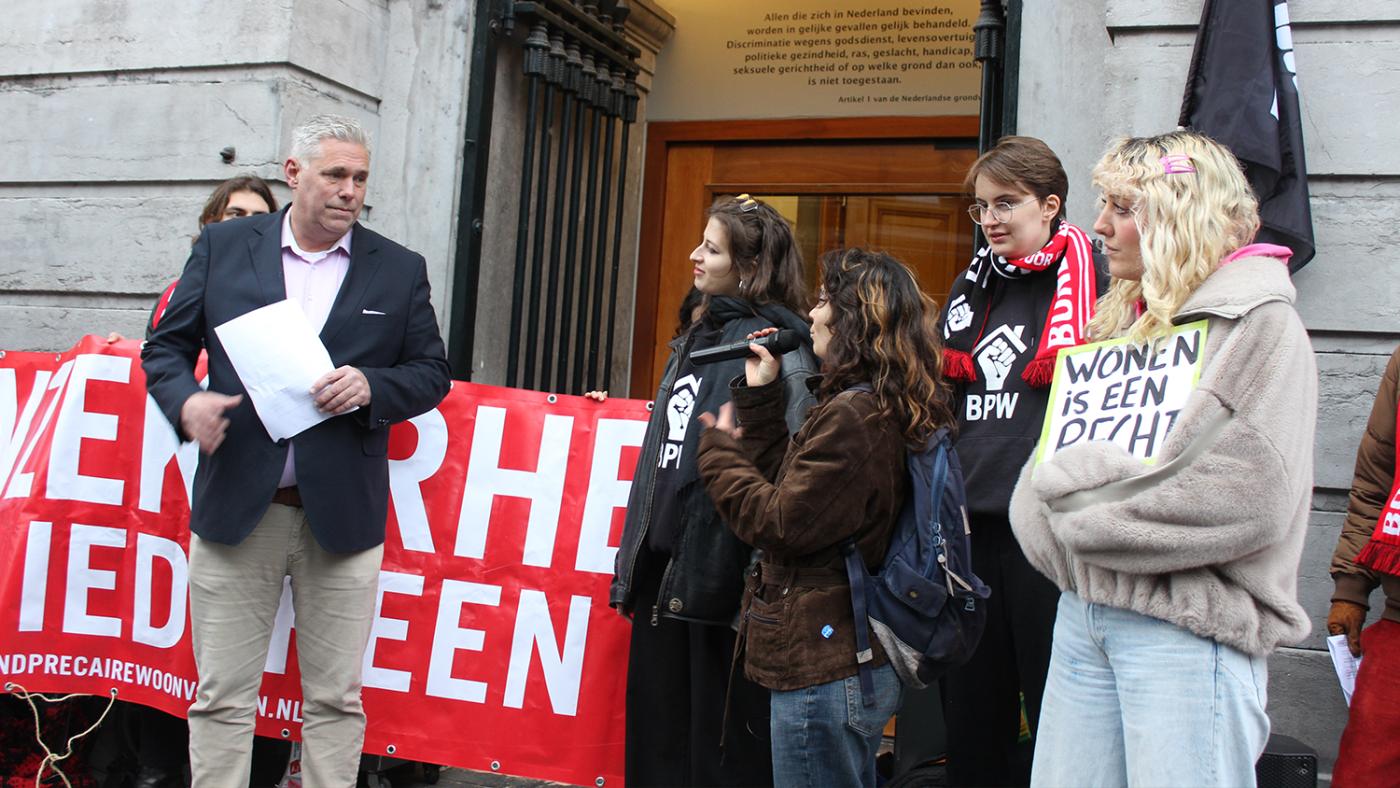
The tenants' demands were handed over to the chairman of the Municipal Council's Housing Committee. Photo: Koen van den Helder
In action
When the tenants were told they would have to move out to let other tenants in who would also be given contracts for a few years, they set up an action group called "Save Ravel". They also sought the Union of Precarious Housing, an association that stands up "for the housing rights of people living temporarily, insecurely or too expensively". A group of sympathisers joined the tenants in a march to the town hall last Wednesday. Sanne and Ilse were there too.
The protest group presented a list of demands to the chair of the municipal council's housing committee, including housing security and control, preventing homelessness and preserving the current community in the neighbourhood. Political party Bij1 said it supported the list, while the party Student & Starter was slightly more cautious, despite expressing its commitment to the tenants. The municipal council's Housing Committee will discuss the issue on February 6.
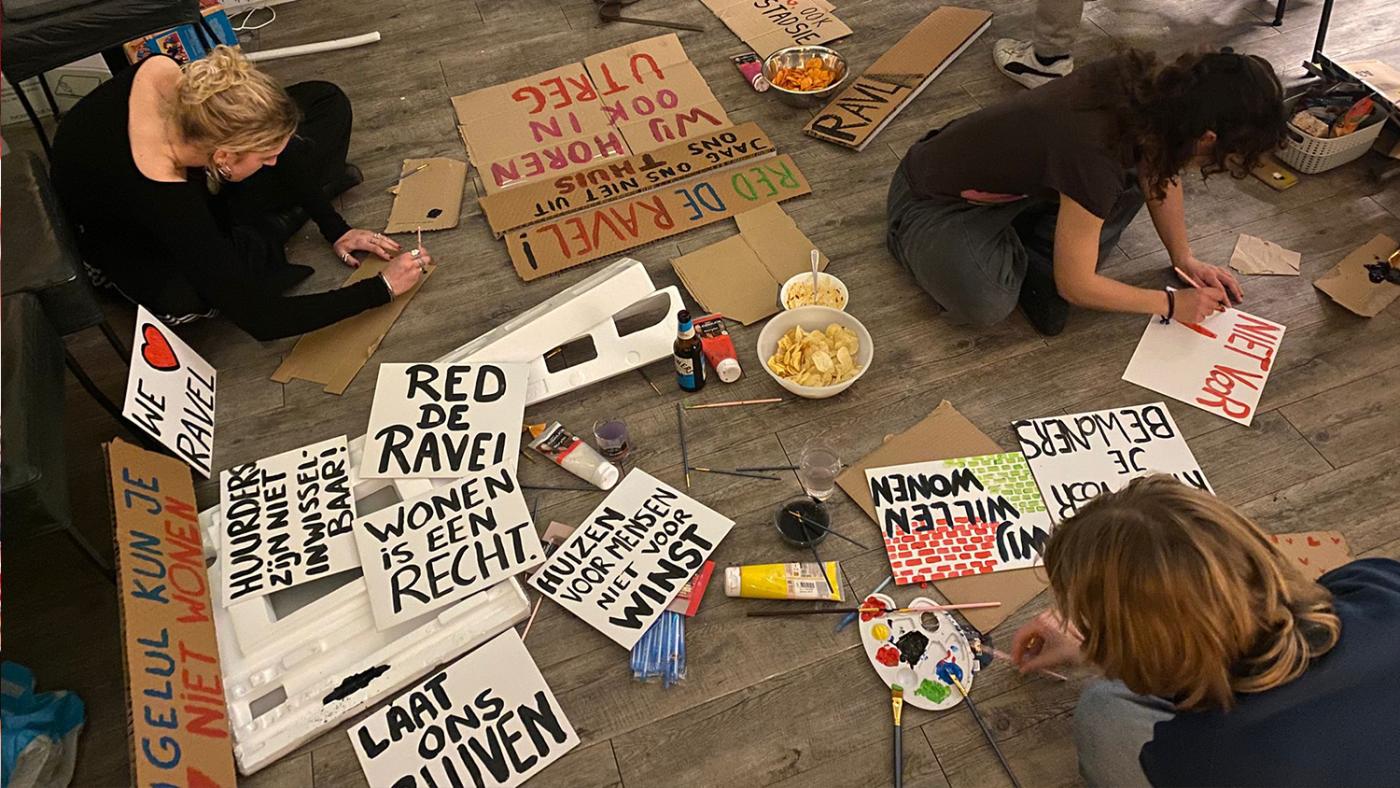
The tenants made protest signs the night before the protest. Photo: Ilse
Senna (22) is the leader of the protest groups. She believed Ravel's residents should be given tenancy rights. "Temporary rent is not rent, it's terrible. It doesn't give people housing security. They should show some humanity by protecting the people here and the communities." She has been living at Ravel for three years and regrets that the municipality is "unwilling to look outside the legal system" to find a sustainable solution to the housing problem.
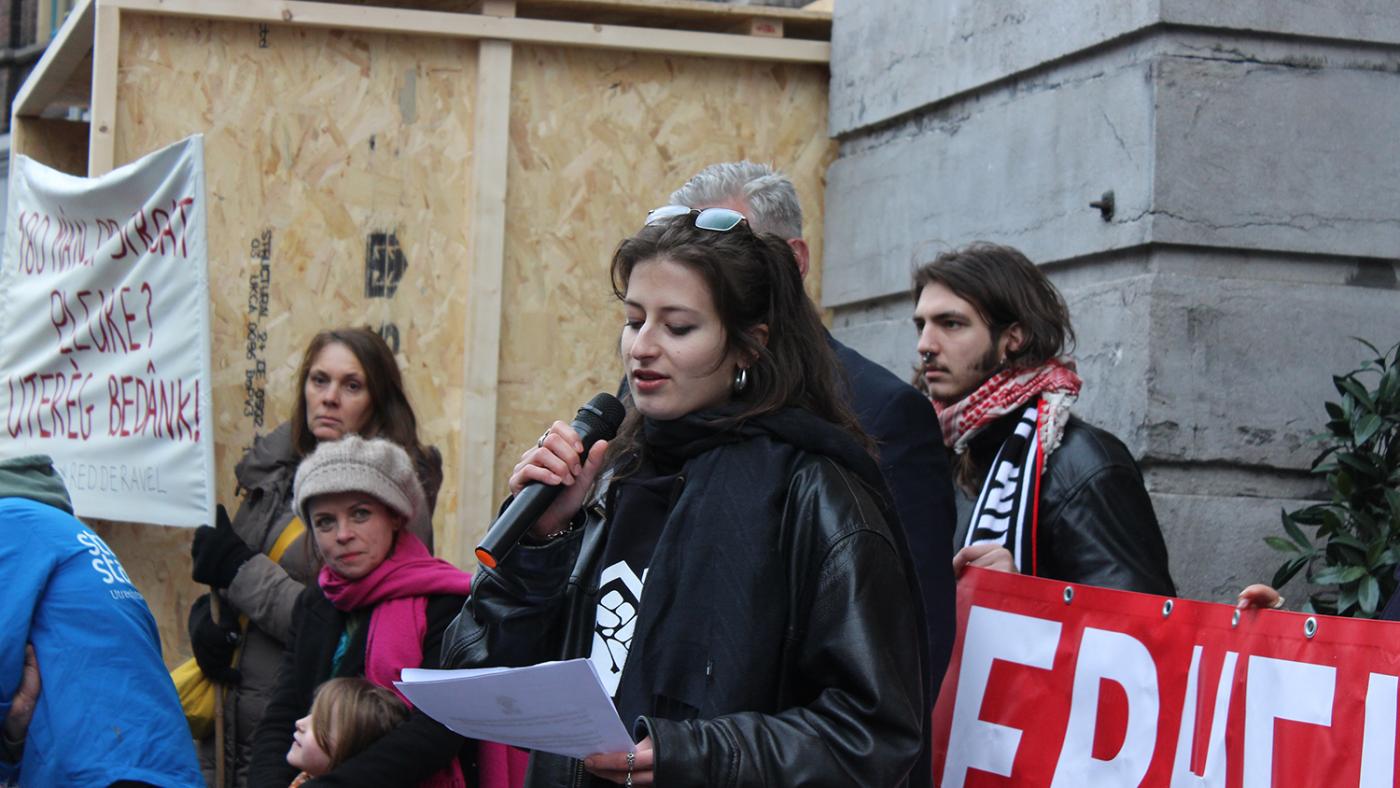
Senna gave a speech at the protest. Photo: Koen van den Helder
Moving back in with their parents or crashing on friends' couches
The protest is making the tenants hopeful, so much so that no one living on Ilse and Sam's floor has moved out yet. "We'll have a big problem if all hope is gone," Sam says with a paltry smile. Some people have already moved out of other floors.
They hope next Thursday's debate will bring some good news, but if it doesn't, they will have to start looking for a new room. Ilse: "Fortunately, we can still move back in with our parents. Mine live in Ede and Sam's live in Hengelo." Sam notes that this wouldn't be ideal, "but we also have housemates with nowhere to go so they might have to couch surf."
Moving out would be a bitter pill to swallow for Ilse as she has only been living at Ravel for four months. "If I'd moved here in May, I could have stayed for another two to five years," she sighs. After living there for two and a half years, Sam's issues are slightly different: "I'm almost done studying now, so finding something is even more difficult."